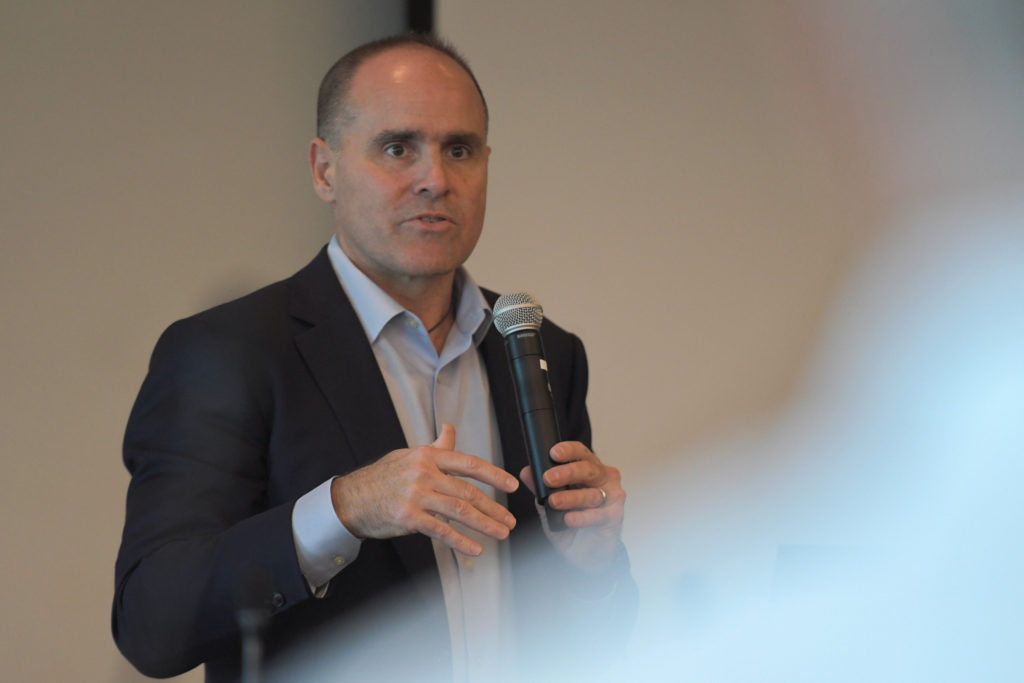GW has joined the ranks of many of its peer institutions by establishing an ethics office.
The Office of Ethics, Compliance and Privacy will launch Feb. 1 to oversee compliance, conflicts of interest and data security, officials announced in an email to faculty last week. Ethics and higher administration experts said the office will standardize who will respond to faculty and staff concerns about breaches of morals and help GW address a growing concern about data privacy across the nation.
Eight of GW’s 12 peer schools maintain ethics offices, including Northeastern University and the University of Pittsburgh.
Of the schools with ethics offices, only the University of Southern California includes data privacy under its ethics umbrella. The other seven include data privacy and security in their information technology divisions.
“We recognize the importance of establishing a culture of trust and high integrity,” Mark Diaz, the executive vice president and treasurer, said in the email to staff last week. “In order to achieve this, an emphasis must be placed on ethics, compliance and privacy across the University.”
University spokeswoman Lindsay Hamilton declined to answer 12 questions about the new office, deferring to Diaz’s email.
Hamilton declined to say when officials started planning the new office and who took part in the process. She also declined to say how many employees will staff the new office and how much the office’s budget will be.
She declined to say how the office will improve the processes for compliance, risk management and conflict of interest and how officials will evaluate the office’s success. She also declined to describe the general structure of the office.
She declined to say how faculty, staff and students will interact with the office. She also declined to say what other universities officials looked toward when building the office.
She declined to say why the office decided to hire Dorinda Tucker as the inaugural assistant vice president for ethics, compliance and risk and data privacy officer or what issues officials hoped she would tackle in her first year.
Officials in similar offices at peer institutions said ethics offices have become more important as schools attempt to prevent regulation and policy infractions in the digital age.
James Ward, the associate vice president for compliance and ethics at Georgetown University, said the importance of ethics offices in higher education has grown in recent years as a rise in ethical scandals necessitate a more unified approach to handling potential violations. Last year, officials at Georgia Tech raised questions over the relationship between an administrator and an outside company, and two years ago, the University of Southern California fired its former medical dean for using illegal drugs and hiring escorts.
“An office that can support, coordinate and monitor all of the various offices that have compliance-related responsibilities at a university, while helping to reinforce and bolster its culture of integrity, is really helpful,” Ward said in an email.
Officials working in ethics offices often have to play several roles, acting both to investigate suspected ethical violations and exhort staff to act in an ethical manner, Ward said.
“I remember reading years ago that a good compliance officer needs to be simultaneously an evangelist, a coach and a cop,” Ward said. “There’s truth to this.”
But an ethics office, many staffed by only a handful of full-time personnel, cannot monitor everyone, he said. Many offices struggle to constantly enforce rigorous ethical standards on a large and sometimes resistant staff who sometimes consider an ethics office to be overly bureaucratic and superfluous, Ward said.
“Striking the right balance with the ‘ethics’ component of a compliance and ethics program can be challenging,” Ward said. “You can’t really mandate integrity.”
Seth Kornetsky, the executive director of audit and management advisory services at Tufts University, which does not have a stand-alone office for ethical compliance, said an anonymous reporting system can help compliance officials ensure all employees are abiding by their university’s code of conduct.
“For those individuals who are reluctant to self-identify if they see wrongdoing, it is important to provide for anonymous reporting of suspected employee misconduct,” Kornetsky said in an email.
Compliance officials can also support a culture of transparency on campus by reminding employees of their obligations and ensuring all reported violations are treated equally, Kornetsky said.
A University-sponsored culture assessment found earlier this month that employees were not satisfied with the leadership accountability and transparency at GW.
Scott Jaschik, the editor of Inside Higher Ed, said ethics offices are not “rare” but are more commonly found at universities that have a more complicated structure, like schools that also operate a hospital. The complexity of a university can confuse employees and make them unsure of who can resolve their problems.
“One of the issues that universities face is, ‘Who do I report something to?’” he said. “And presumably, you report to the ethics offices.”
Jaschik added that making data privacy a component of the office reflects nationwide concerns about data security, especially with more intensive federal regulations for university hospitals and medical centers.
Officials have been working over the past year to strengthen GW’s medical enterprise and forge better relationships between the GW Hospital, Medical Faculty Associates and the School of Medicine and Health Sciences. The University acquired more administrative rights over the MFA in December.
“Data privacy is a big issue, and you want to make it possible for people to report concerns,” he said.
Cayla Harris contributed reporting.





